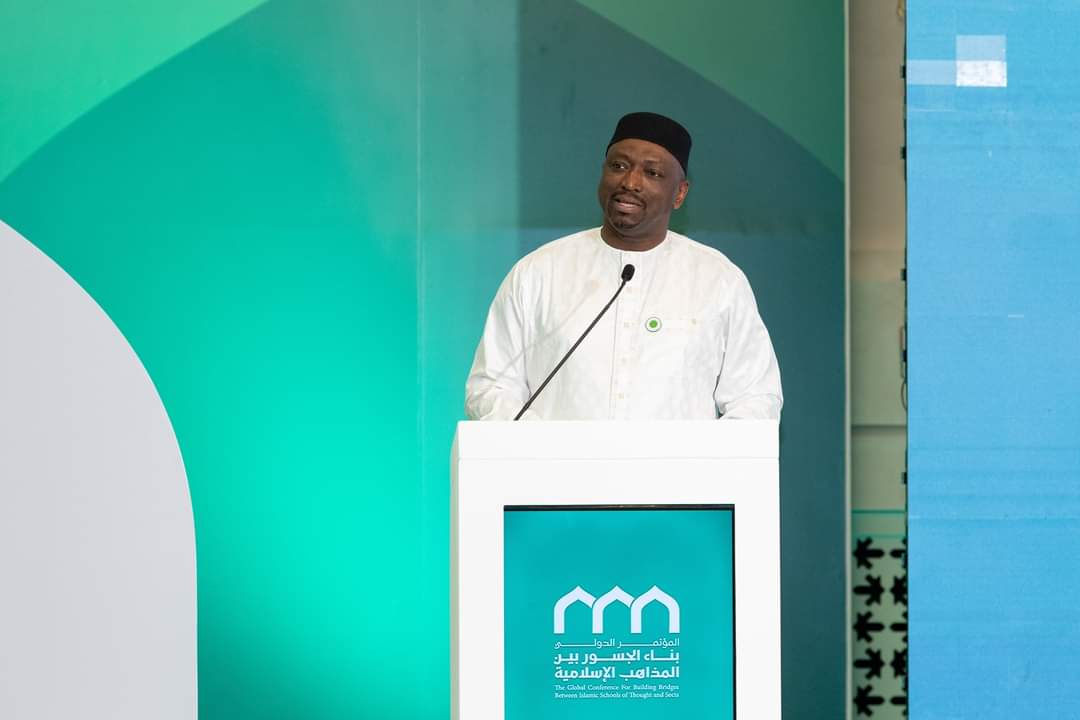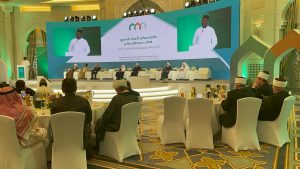
H.E. Prof. Koutoub Moustapha Sano, Secretary General of the Academy, participated in the International Conference: “Building Bridges between Madhāhib (Islamic Schools of Law)” organized by the Muslim World League under the generous patronage of the Custodian of the Two Holy Mosques. His Excellency delivered a speech at the conference’s closing session on Monday 08 Ramadan 1445, corresponding to 18 March 2024, in Makkah Al Mukarramah.
The Secretary General expressed heartfelt gratitude to the Kingdom of Saudi Arabia, its King, Crown Prince, government, and people for the esteemed invitation and generous support extended for this pivotal conference during a historic juncture for our Ummah. He also expressed appreciation to the Secretary General of the Muslim World League, Sheikh Dr. Mohammed bin Abdul Karim Alissa, for initiating an event that reignites hope within the Ummah and illustrates that many challenges faced by the Islamic world can be addressed.
His Excellency emphasized that the intellectual and political challenges confronting the Ummah at this critical juncture necessitate unity in sentiments, feelings, and rituals. He underscored the significance of realizing and applying the teachings of the Almighty, highlighting the unity emphasized in the Quran and Hadith. Quoting from the Quran: “This nation of yours is one nation, and I am your Lord, so have taqwa in me” and from the Prophet PBUH: “The example of the believers in their solidarity, compassion, and sympathy is like a single body, if one member complains of it, the rest of the body will help it.”
Delving into the essence of Islamic schools of law, His Excellency elucidated that these represent sincere scholarly endeavors throughout history, forming the intellectual fabric of the Ummah. He emphasized the significance of these schools of law, woven around foundational Islamic principles drawn from the Quran and Sunnah, as exemplified in the hadith reported by Umar RA:
“We were sitting with the Messenger of Allah, peace and blessings be upon him, one day, a man appeared with very white clothes and very black hair. There were no signs of travel on him and we did not recognize him. He sat in front of the Prophet, rested his knees by his knees, and placed his hands on his thighs. The man said, “O Muhammad, tell me about Islam.” The Prophet said, “Islam is to testify there is no God but Allah and Muhammad is the Messenger of Allah, to establish prayer, to give charity, to fast the month of Ramadan, and to perform pilgrimage to the House if a way is possible.” The man said, “You have spoken truthfully.” We were surprised that he asked him and said he was truthful. He said, “Tell me about faith.” The Prophet said, “Faith is to believe in Allah, His angels, His Books, His Messengers, the Last Day, and to believe in providence, its good and its harm.” The man said, “You have spoken truthfully. Tell me about excellence.” The Prophet said, “Excellence is to worship Allah as if you see Him, for if you do not see Him, He surely sees you.” The man said, “Tell me about the final hour.” The Prophet said, “The one asked does not know more than the one asking.” The man said, “Tell me about its signs.” The Prophet said, “The slave-girl will give birth to her mistress and you will see barefoot, naked, and dependent shepherds compete in the construction of tall buildings.” Then, the man returned and I remained. The Prophet said to me, “O Umar, do you know who he was?” I said, “Allah and His Messenger know best.” The Prophet said, “Verily, he was Gabriel who came to teach you your religion.”
Hence, His Excellency said: These three principles, namely Islam, faith, and ihsan (excellence), together constitute religion, meaning that religion is Islam, faith and ihsan(excellence), and madahib or schools of law arose around issues related to these principles, which means that the madhhabs we are talking about are doctrinal, jurisprudential and educational principles that arose through the consideration of texts related to the mentioned principles, and the Ummah has a substantial intellectual wealth that is rare in many nations.

As for building bridges that this conference calls for, His Excellency said: “The real bridges exist, and they need to be highlighted, purified, developed, and promoted, and this is achieved by maintaining a number of recommendations that we present to this blessed conference, namely by:
Firstly, reinforcing the firm belief in the sanctity of three things, which are the sanctity of bloodshed, violation of honors, and annihilation of property, i.e., believing in the sanctity of the blood of the schools’ followers, the sanctity of their honors, and the sanctity of their property, in accordance with the hadith, ” Everything belonging to a Muslim is inviolable for a Muslim; his honour, his blood and property..”
Secondly, it is forbidden to excommunicate the imams and followers of the mainstream Islamic schools, in compliance with the words of the Prophet PBUH “If anyone observes our form of prayer, faces our qibla, and eats what we kill, that one is a Muslim who has protection from God and His messenger; so do not betray God’s protection.”
Thirdly, it is forbidden to challenge and question the doctrines of the imams of the known schools and their followers. His Excellency also stressed the need to avoid challenging and questioning allegiances, especially those of the imams who left a wealth of intellectual, theological, jurisprudential, and educational wealth.
Fourthly, Rather, they should love them as they love each other and appreciate them as they appreciate each other, and then this disagreement will disappear. His Excellency explained that disagreement is a natural norm and a divine will and that this disagreement is a difference of diversity and not a difference of contradiction and antagonism, as it should be.
Finally, His Excellency expressed his hope that this conference will achieve its objectives by keeping these bridges strong and solid through the charter that will be issued by the end of the conference, leading to a transition from theoretical talk about the unity to practical talk through these criteria, values, and foundations, of which there is no room to mention more.
Read Also
Lastest









